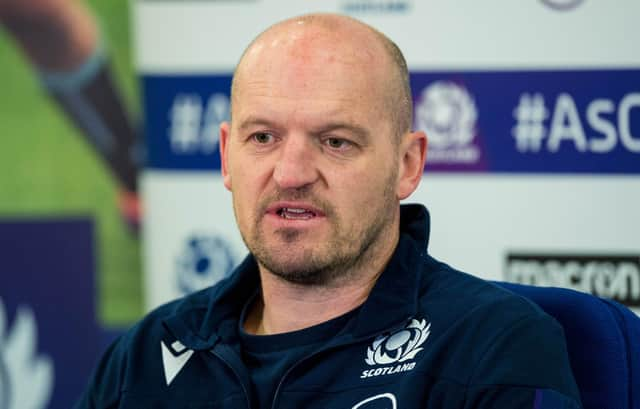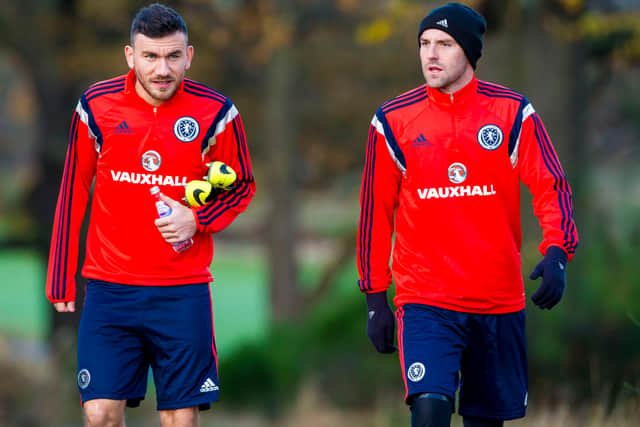Gregor Townsend: ‘We must create an environment where people can open up, not bottle up’


Scotland rugby head coach Gregor Townsend has added his influence to the growing campaign to care for the mental health of young athletes, young people in general, and wider society, in this bleak time of lockdown and anxiety for the country.
Speaking on the popular YouTube podcast which has been launched by Scotland international footballers Kris Boyd, pictured, and Robert Snodgrass – The Lockdown Tactics –Townsend spoke about the mental health struggles he has experienced during his playing and coaching career and urged people to open up about any mental strain they may be feeling.
Advertisement
Hide AdAdvertisement
Hide AdEarlier in the week, former Rangers and Scotland striker Boyd spoke movingly about the heartbreaking suicide of his younger brother, Scott, and, ahead of the start of Mental Health Week on Monday, the podcast has been doing some great work.


Boyd forged a bond with Townsend when the rugby boss came to speak to aspiring football coaches on their pro-licence course and yesterday the 82-times capped former British and Irish Lion was a guest on the show.
“I think it’s an issue we all have to deal with. More and more throughout society we are dealing with it and people are opening up,” said Townsend. “But there’s still a lot of people who, for whatever reason, are keeping the problems to themselves. It is things that we see in sport with the expectations we place on young men in our sport, and obviously your guys in football, the changes in their lives, the pressure of performing, getting a contract, coming back from injuries and not playing as well as you can. These are things that are much easier to deal with if you can open up with those around you. But, on too many occasions, that doesn’t happen and it makes it tough for these young men.”
Dark times during his own playing career
Townsend, regarded as the most gifted Scottish rugby player of his generation, if at times erratic, speaks of some dark times during his playing career. Injury robbed him of a place at the iconic 1995 World Cup in South Africa and a move to France from Northampton to Brive “to take me out of my comfort zone” went a bit too far with his wife still in London, no other English speakers in the squad and a volatile coach who turned against him.
Townsend also speaks about the crossroads he found himself at post-playing in an unsatisfactory period of assistant coaching with Scotland between 2009 and 2012 before he took off as an ultimately Pro12-winning head coach of Glasgow Warriors and the top job with the national team.
Many of the anecdotes will be familiar to rugby enthusiasts from his excellent Talk Of The Toony autobiography but new to many. There were plenty of light-hearted moments but Townsend was serious about the driving message on mental health.
Asked if rugby was doing enough on this, he was frankly honest. “No, I think we can do better,” he said.
“I think the environments are changing. Maybe, in the past, it would be a sign of weakness or perceived as a sign of weakness to say you’re struggling either physically or mentally, but that environment is changing, certainly in the groups I’ve worked with.
Advertisement
Hide AdAdvertisement
Hide Ad“We want to encourage that and get them to open up. They might not want to come and speak to a head coach or [assistant] coach, it might be a team-mate. There is always the mechanism for them to speak to someone who is an expert in that area, a psychologist.
“So, we have to do better. We have to look and find out if players are struggling because a lot hide it from others. So just looking to see ahead of when they are really struggling and try and help them out.”
The dangers of social media
The elephant in the room of social media was quickly addressed and Townsend reflected on his old Gala amateur days in the early 1990s when “a few supporters and the local paper at the end of the week” would pass comment on a bad performance.
“With the modern generation we are dealing with now, social media provides an outlet for even more pressure that wasn’t there before,” said Townsend. “Social media can be a great thing but, after a defeat playing for your country, it can be a bad thing if people are having a go at you personally. So, we have to create an environment where people can open up, not bottle up, and move on. That is a strength to show you are vulnerable at times, whether that is as a head coach or a leader or a player to go ‘look, I’m struggling here. I need help’. That’s a strength rather than a weakness.
“I think it is changing. Every part of society is dealing with social media. Whether you have 10,000 followers or 10 million followers, there are always going to be extremes of comment. Whether they love you or think you’re a disgrace because you didn’t play as well. It’s important that we’re not judged on what we do on the field and have to live up to a certain image of a type of player and we don’t have to live up to that. It’s difficult to park that.
“Phones are now a massive part of our lives and the brain gets a little a kick when you see something positive about yourself and a negative kick the other way.”
Townsend noted that mental health issues can strike sportspeople even when they are at the peak of their powers, riding the crest of the wave, injury-free and seemingly on top of the world.
“[Former England stand-off] Jonny Wilkinson, left, is a great example. He’s spoken about not wanting to leave his hotel room,” said Townsend.
Advertisement
Hide AdAdvertisement
Hide Ad“When he was regarded as the best player in the world, winning the World Cup, and what you saw of his performances were bravery, accuracy, just brilliant play. But inside he was just hating it, he was hating the pressure and that’s not unique. You can take that to extremes and not enjoy your life.”Townsend insists that the issues surrounding mental health are very much at the forefront of his mind at this difficult time and will be even more so when sport finally resumes.
“As a coach I feel a real privilege when someone opens up to me, my door is always open,” he said. “It’s a feeling they are showing their bravery and courage to say that to a coach.
“I’d love for it to happen more. It’s difficult when you’re not an expert or a psychologist, but I do think it can be better if you set up an environment when people can talk openly.”
The Lockdown Tactics is a brand new podcast, hosted by former Scotland stars Robert Snodgrass and Kris Boyd.
Every week TLT will talk to big names with its core focus being on Mental Health and Wellbeing. Its chosen charity partner is The Kris Boyd Charity. To watch the full interview with Gregor, go to YouTube and the various Lockdown Tactics social media platforms.
A message from the Editor:
Thank you for reading this story on our website. While I have your attention, I also have an important request to make of you.
With the coronavirus lockdown having a major impact on many of our advertisers - and consequently the revenue we receive - we are more reliant than ever on you taking out a digital subscription.
Subscribe to scotsman.com and enjoy unlimited access to Scottish news and information online and on our app. With a digital subscription, you can read more than 5 articles, see fewer ads, enjoy faster load times, and get access to exclusive newsletters and content. Visit https://www.scotsman.com/subscriptions now to sign up.
Advertisement
Hide AdAdvertisement
Hide AdOur journalism costs money and we rely on advertising, print and digital revenues to help to support them. By supporting us, we are able to support you in providing trusted, fact-checked content for this website.
Joy YatesEditorial Director
Comments
Want to join the conversation? Please or to comment on this article.